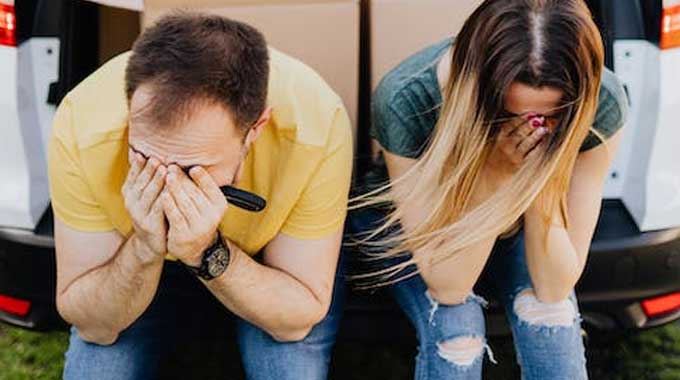We all go through periods of life where we feel anxious. It may even be a fairly common experience, especially if it's related to life events. Feelings of anxiety before a big work deadline, before traveling, or making decisions, for example, are completely natural.
However, if anxious feelings permeate your existence and impact your everyday life it could indicate you are living with an anxiety disorder.
If you are concerned that you, or someone you know, is living with significant levels of anxiety, help is available and you can look to a future without the constraints of a debilitating mental health condition. Many people choose anxiety treatment without medication, there are a wide number of alternative therapies which can be extremely effective without the risk of any side effects.

What is Anxiety Disorder?
Anxiety is a common condition in the United States. Recent research by The National Institute of Mental Health (NIMH), found around 19.1% of US adults aged 18 and over suffered from an anxiety disorder in the previous year.
This is almost one in every five people, making it one of the most common mental illnesses to be experienced by American adults.
Within the wider category of anxiety disorders, there are five main conditions that share symptoms but also have unique elements.
Common Anxiety Symptoms
Unfortunately, sometimes people conflate anxiety with feeling stressed or worried about something. In fact, anxiety is a serious and debilitating condition with both physical and emotional symptoms.
As aforementioned, each form of anxiety differs from the others but there are some symptoms that run through all of them. The following symptoms are associated with all five forms of anxiety disorder:
Physiological Symptoms
- Lightheadedness or feeling dizzy
- Aches and pains throughout the body
- Headaches and nausea
- Irregular heartbeat
- Difficulty getting to or staying asleep
- Gastrointestinal issues such as cramps and bowel issues
- Sexual dysfunction
- Rapid breathing
- Increased perspiration
- Trembling or shaking
- Feeling physically weak and tired
Psychological Symptoms
- Intense feelings of fear
- Experiencing panic attacks
- Feeling nervous and restless
- Having a deep-seated feeling of looming danger
- Unable to turn off or control feelings of worry
- Feeling the need to avoid things that are anxiety provoking
If these symptoms are familiar to you, it's advisable you seek out professional help. Trained mental healthcare providers can provide you with an accurate diagnosis and offer evidence-based advice on the best way to move through treatment.
Different Forms of Anxiety Disorders
These five disorders include the following:
- Generalized Anxiety Disorder
- This condition, often referred to as GAD, manifests as persistent feelings of anxiety, fear, and tension, without obvious provocation. People with GAD may worry about upcoming events — even things that seem ordinary like going to school or the shop.The worry is not usually reflective of reality, but it is extremely difficult to control the fear and can induce significant physical symptoms. Those with GAD may also have other anxiety disorders or mental health conditions such as depression.
- Panic Disorder
- Panic disorder is typically characterized by overwhelming and unexpected periods of severe panic, which may be accompanied by physical symptoms. People with this condition may feel suddenly gripped with fear and experience breathing difficulties and a rapid heartbeat.
- Post-traumatic stress disorder (PTSD)
- This condition happens as a response to a traumatic event where you were harmed, you saw somebody be harmed, you could have been harmed, or you harmed somebody else. If the body does not process this trauma, you may be left with PTSD. Symptoms of this disorder include intrusive memories of the event, severe low mood, anger, shame, and guilt.
- Social Phobia
- This form of anxiety generally manifests in feelings of extreme anxiety and self-consciousness in social scenarios. People with social phobia may avoid socializing due to feelings of nervousness, low self-esteem, and fear of judgment from others.
- Obsessive-compulsive disorder (OCD)
- People living with obsessive-compulsive disorder will experience obsessive thoughts or rumination, which they try to manage with compulsions. Compulsions are repetitive behaviors, such as counting, cleaning, blinking, hoarding, and saying certain words repeatedly.
Anxiety disorder is likely to interfere with everyday life, some people may find it difficult to fulfill their normal responsibilities when symptoms are particularly bad.
Why Does Anxiety Develop?
Much like other mental illnesses, anxiety is thought to develop for a number of reasons. These include things such as; genetics, experiencing trauma or difficulties in childhood, and difficult life events. Uncomfortable social situations, such as living with strangers or moving to a new place, could also play a part, as well as other conditions such as ADHD or autism spectrum disorders.
Treating Anxiety Disorders
No two cases of anxiety are exactly the same, which means that treating anxiety is a completely unique experience too. In recent years significant research has been done into anxiety treatment which means there are now a number of evidence-based options for treatment without medication.
Although there is not a specific cure for anxiety, there are a growing number of ways to experience less anxiety on a daily basis. Some people who go through treatment will find their symptoms rarely, or never, return. If you have tried anxiety medication and found it to be unsuccessful, you may benefit from some of the below non-medication options.
Often a combination of therapies is the most effective way to treat anxiety as they complement each other.
Self-Love and Care
Regardless of whether you are living with a mental health condition or not, taking good care of yourself is the number one way to improve your mental well-being. If you are looking for ways to reduce anxiety without medication, prioritize your well-being through a number of healthy lifestyle changes.
Some of the most significant things you can incorporate into your daily life include:
- Practice mindfulness meditation
- Meditation has long been used for its calming and grounding effect. You can use a simple meditation audio or video to get started if it's a new concept for you. Deep breathing techniques which are used in meditation send signals to your body that you are in a safe environment and can reduce stress.
- Ensure you eat a healthy diet
- The healing properties of food are an important part of every recovery. This is especially true for people trying to manage anxiety. Missing meals or eating sugary junk food can result in blood sugar drops which can increase anxiety levels.Instead, try to incorporate a balanced diet with foods high in antioxidants that have anxiety-reducing benefits, such as dark leafy greens, berries, ginger, and beans. Herbal supplements and herbal tea can be a great addition to your diet too.
- Engage in regular exercise
- Physical movement is a brilliant, natural anti-anxiety treatment. By raising your endorphin and serotonin levels, exercise increases your overall mood. Aerobic exercise can improve sleep, lower stress hormone levels in the body, and regulate blood sugar. Exercise also works by focusing your mind and grounding you in the present moment. Even better, is physical activity in the fresh air.
- Stick to a bedtime routine
- Sleep is the best natural medicine, without a good night's sleep we are unable to recover from the day and recuperate for the day ahead. Healthy energy levels are associated with a positive mood and a calm nervous system.Lack of sleep makes you more susceptible to stress and anxiety which makes it even more crucial to get adequate rest. Aim for eight to nine hours of sleep every night, and try to stick to similar waking and sleeping times to create an established sleep routine.
Whether you are living with a mental health condition or not, incorporating these self-care practices into your life can significantly improve your well-being and change your outlook on life. If you are living with severe anxiety, you can use these in combination with other treatments to reduce anxiety symptoms.
Therapy
Therapy is often used to treat anxiety, and evidence shows it can be an extremely effective method. If you are looking for ways to relieve anxiety, therapies which challenge negative or unhelpful thought patterns can be effective.
A mental health professional will be able to advise you of the therapies available to you. The Anxiety and Depression Association (ADAA) recommends a number of therapy options including; cognitive-behavioral therapy (CBT), dialectical behavioral therapy (DBT), and interpersonal therapy (IPT).
Depending on your personal circumstances you may benefit from a few therapy sessions, while others may require regular sessions for a period of time to treat anxiety. Your therapist will work through the underlying causes of your condition and help you find healthier coping strategies which you can use to prevent anxiety from increasing.
Build Boundaries
You may have specific triggers which induce anxiety, but sometimes it builds from nowhere. Keeping space in your diary for time with yourself can be a really helpful technique in stress management.
If you continuously say yes to people for fear of letting them down, you are likely to have a build-up of stress and struggle with emotional regulation. Recognize your limits and try to vocalize them.

The Importance of Addressing Anxiety
If you have lived with anxiety for a long time, it might be difficult to imagine your life without this disorder. Anxiety can permeate many aspects of your life; your career, studies, physical and mental health, and your relationships. People with anxiety are more likely to go on and develop another mental illness, including substance misuse.
It might feel scary, but reaching out for help and working to combat anxiety can improve your life in so many ways. Without anxiety symptoms holding you back you will be able to take part in things you've always wanted to, form new connections with people and move through life with a more positive attitude.
Treatment for Anxiety at GIA Miami
If you are trying to fight anxiety alone it can feel like an insurmountable battle. At GIA Miami, we have years of experience in supporting people through their mental health recovery journey and we are ready to help you get to a brighter future too.
If you are looking for anxiety treatment without medication, we have expert knowledge behind us. We use cutting-edge technology and evidence-based anxiety treatment methods, using a compassionate and kind approach to care.
Ready to get in touch? You can reach us at 561.462.4099, or contact us here.

